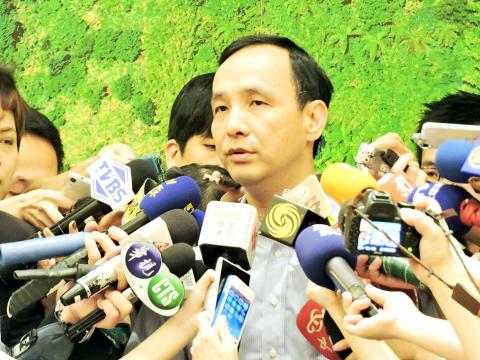Chinese Nationalist Party (KMT) Chairman Eric Chu (朱立倫) yesterday said that as the head of the party, he was obligated to “shoulder the responsibility” should KMT presidential candidate Hung Hsiu-chu (洪秀柱) drop out of the January race.
“As the head of the party, I must tell the truth, which was why I have met with Hung on more than two occasions to inform her of the results of some surveys and concerns voiced by people,” Chu, who is also the New Taipei City mayor, said on the sidelines of a city council meeting yesterday morning.
Chu said he had also advised the deputy legislative speaker to adjust her principles, attitude and ways of making public statements, since it was his responsibility to make mainstream public opinion known to the party’s presidential candidate.

Photo: Lai Hsiao-tung, Taipei Times
“I have always admired how Hung stands firm in her beliefs. She often says her own success and failure, or how many legislative seats the KMT secures in the Jan. 16 elections, are not her priority concerns. However, I think that is where communication is needed,” Chu said.
Chu said he had repeatedly asked Hung to take to heart the legislative elections, otherwise he would have no choice but to start taking care of the bigger picture.
“Hung asked me: ‘Who will take the responsibility [of representing the KMT in the presidential race] then?’ I replied: ‘As the chairman of the party, it would be my unshirkable responsibility and I am willing to shoulder all duties if necessary,’” Chu said.
Chu’s comments appear to contradict his previous statements that he would serve out his term as New Taipei City mayor and unite the KMT to support Hung, who won the party’s nomination in July after meeting its primary requirements.
They also came after a flurry of media reports on Monday that said he was planning to step down as mayor next week and vie for the presidency in Hung’s stead.
The presidential election is not all about conveying one’s values and beliefs, Chu said.
“As KMT chairman, I also have to factor in mainstream public opinion, the party’s survival and development, and the number of seats that its legislative candidates win,” he said.
Chu said that on Monday, he had informed President Ma Ying-jeou (馬英九), Vice President Wu Den-yih (吳敦義) and Legislative Speaker Wang Jin-pyng (王金平) about the latest developments on the issue.
“We will continue to communicate with interested parties in the following two days, in the hope of forging a consensus within the party,” he added.
Asked about the likelihood of him running for president without resigning as mayor, Chu declined to comment on a hypothetical question, saying only that communication is under way and that every discussion he has had with Hung went amicably.
Wang also confirmed that he spoke with Chu on Monday night about party affairs, including members’ concern and advice the party’s next step.
Wang denied that Chu had directly stated his intention to run for president during the talk.
When asked whether he would replace Hung as the candidate, Wang said he has “no [weapon] in hand” as he did not “obtain a form” to join the party primary.”
Additional reporting by Alison Hsiao

A Ministry of Foreign Affairs official yesterday said that a delegation that visited China for an APEC meeting did not receive any kind of treatment that downgraded Taiwan’s sovereignty. Department of International Organizations Director-General Jonathan Sun (孫儉元) said that he and a group of ministry officials visited Shenzhen, China, to attend the APEC Informal Senior Officials’ Meeting last month. The trip went “smoothly and safely” for all Taiwanese delegates, as the Chinese side arranged the trip in accordance with long-standing practices, Sun said at the ministry’s weekly briefing. The Taiwanese group did not encounter any political suppression, he said. Sun made the remarks when

PREPAREDNESS: Given the difficulty of importing ammunition during wartime, the Ministry of National Defense said it would prioritize ‘coproduction’ partnerships A newly formed unit of the Marine Corps tasked with land-based security operations has recently replaced its aging, domestically produced rifles with more advanced, US-made M4A1 rifles, a source said yesterday. The unnamed source familiar with the matter said the First Security Battalion of the Marine Corps’ Air Defense and Base Guard Group has replaced its older T65K2 rifles, which have been in service since the late 1980s, with the newly received M4A1s. The source did not say exactly when the upgrade took place or how many M4A1s were issued to the battalion. The confirmation came after Chinese-language media reported

The Taiwanese passport ranked 33rd in a global listing of passports by convenience this month, rising three places from last month’s ranking, but matching its position in January last year. The Henley Passport Index, an international ranking of passports by the number of designations its holder can travel to without a visa, showed that the Taiwan passport enables holders to travel to 139 countries and territories without a visa. Singapore’s passport was ranked the most powerful with visa-free access to 192 destinations out of 227, according to the index published on Tuesday by UK-based migration investment consultancy firm Henley and Partners. Japan’s and

BROAD AGREEMENT: The two are nearing a trade deal to reduce Taiwan’s tariff to 15% and a commitment for TSMC to build five more fabs, a ‘New York Times’ report said Taiwan and the US have reached a broad consensus on a trade deal, the Executive Yuan’s Office of Trade Negotiations said yesterday, after a report said that Washington is set to reduce Taiwan’s tariff rate to 15 percent. The New York Times on Monday reported that the two nations are nearing a trade deal to reduce Taiwan’s tariff rate to 15 percent and commit Taiwan Semiconductor Manufacturing Co (TSMC, 台積電) to building at least five more facilities in the US. “The agreement, which has been under negotiation for months, is being legally scrubbed and could be announced this month,” the paper said,